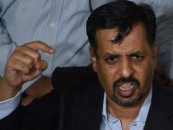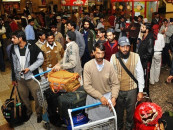The name won’t be Khan
The moral of this story is that as long as the feudal structure stays, Imran Khan stays out.

These arguments, though well-meaning and for the most part fairly adroit, are also unfortunately irrelevant. For it isn’t Khan’s bona fides that one must worry about, but that the system of electoral machinations, which is vehemently against the outsider.
Consider the facts on the ground. The PTI’s appeal, though rising, is based largely around urban centres. The party’s supporters are the urbane city dwellers, who for the large part excel at couch analysis, latte sipping, and categorical activism through the consistent updating of Facebook statuses and Twitter one-liners (please note, at this juncture, that I very much count myself as part of the Facebook updating, tweeting, cappuccino cohort). Now, there’s nothing intrinsically wrong with this. In fact, it’s a non-violent, semi-progressive agenda that does not give leeway to the same dichotomy of thieves that have been robbing all and sundry blind for decades. I support it.
But the nature of Pakistan’s socio-political structure is feudal. This ensures that the mass bulk of your voters are going to vote the way they always have — depending on which constituency they may fall in. Subjected to decades of oversight, they’re in the advanced stages of Stockholm Syndrome, and will relentlessly vote to power the same people who always proceed to disenfranchise them. This seems a bit harsh, so allow me to qualify: landowners, even if of a feudal bent, have some connection to their sundry serfs. They may do very little, but still have more power to effect change in feudal lands than your average white-collar person.
Alas, this calculus has been done before. In 1835, Alexis de Tocqueville stated the danger of democracy becoming the tyranny of the majority. Essentially, this means a majority can impose its views to the detriment of a large minority. This is precisely the case here, with the white-collar vote outweighed by a mass of farmers and workers answerable to their feudal lords. The lords canvas, and arrange for people in their circle of influence to be ferried back and forth from polling stations. They point votes in the direction of their latest decreed alliance.
The moral of this story is that as long as the feudal structure stays, the Khan stays out. Even His Cricketship has mentioned this by way of an anecdote on several an occasion. He talks about how the PTI will sweep the urban centres and lose ground in the rural areas. He blames this on rigging: ‘I would put it down to simple influence of the land-owning classes.’ Even if he were right, and rigging were occurring in far flung polling stations, that too is a by-product of a system in feudal inertia, because an independent election commission has not yet been established in Pakistan. The incumbents have no wish to erode power in the interest of fair play.
So here then is the dilemma. Khan is canvassing against a system that looks after its own — and in the manner of Marx’s structuralism, has created institutions that help it sustain and propagate itself. The PTI’s core constituency is the very sort of urban middle-class that does not have the might of numbers or resources to challenge land and power. In delicious irony, the poor who are being hurt the most by the current system are also helping to sustain it: a stereotypical Marxist construct if ever there were one.
This isn’t about Khan’s suitability as premier, nor about his ideals. It’s simply about a system that is caught up in its own inertia, and looks after its own. Outsiders are not welcome. And the urban classes Khan is courting — or rather the ones who are courting Khan — have a history of not voting anyway. So stick that in your Facebook and update it.
Published in The Express Tribune, October 10th, 2011.















COMMENTS
Comments are moderated and generally will be posted if they are on-topic and not abusive.
For more information, please see our Comments FAQ